.

Dorothy Day: photographer unknown, 1934 (New York World Telegram & Sun Collection, Library of Congress)
The only way to live in any true security is to live so close to the bottom that when you fall you do not have far to drop, you do not have much to lose.
-- Dorothy Day (1897-1980), from Loaves and Fishes, 1967
But I am sure that God did not intend that there be so many poor. The class structure is of our making and our consent, not His. It is the way we have arranged it, and it is up to us to change it. So we are urging revolutionary change.
-- from "Poverty Is to Care and Not to Care," Catholic Worker, April 1953
When people are standing up for our present rotten system, they are being worse than Communists, it seems to me. (2 March 1945)
I too complain ceaselessly in my heart and in my words too. My very life is a protest. Against government, for instance. (8 August 1974)
-- from The Duty of Delight: The Diaries of Dorothy Day, ed. Robert Ellsberg, 2008
We have all known the long loneliness and we have learned that the only solution is love and that love comes with community.
-- from The Long Loneliness: The Autobiography of Dorothy Day, 1952

Dorothy Day: photographer unknown, 1916 (Corbis)
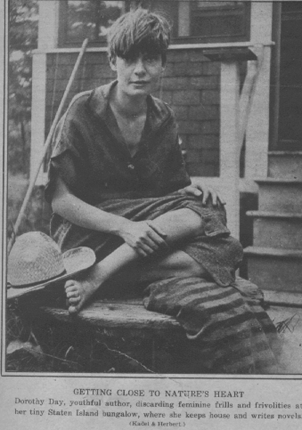
Young Dorothy Day: photographer unknown, n.d. (courtesy of Jim Forest)
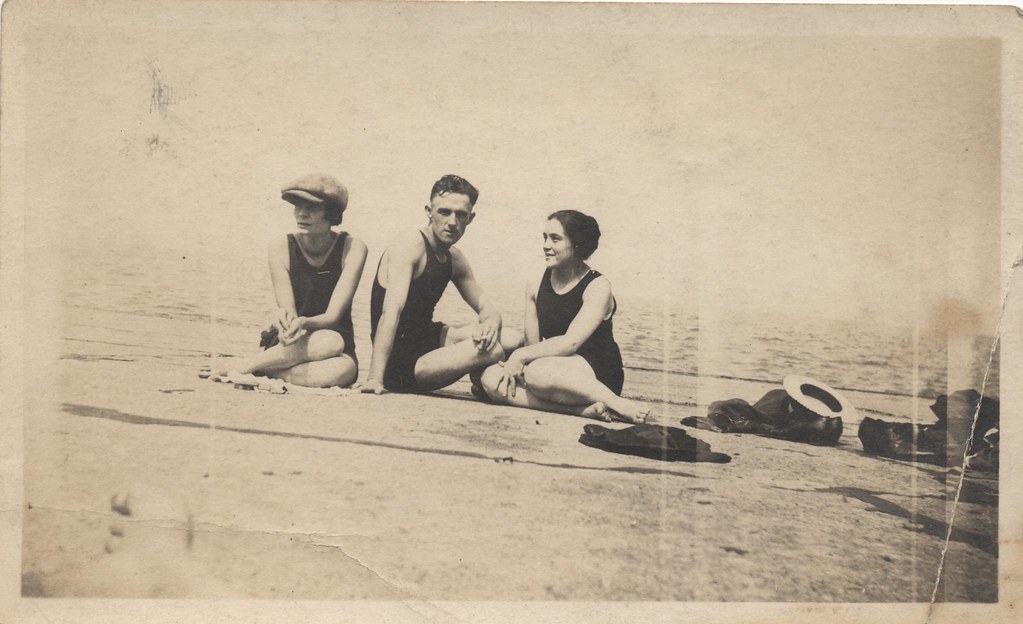
Dorothy Day with Rose and Walter Carmen on the beach, Chicago: photographer unknown, 1923 (courtesy of Jim Forest)
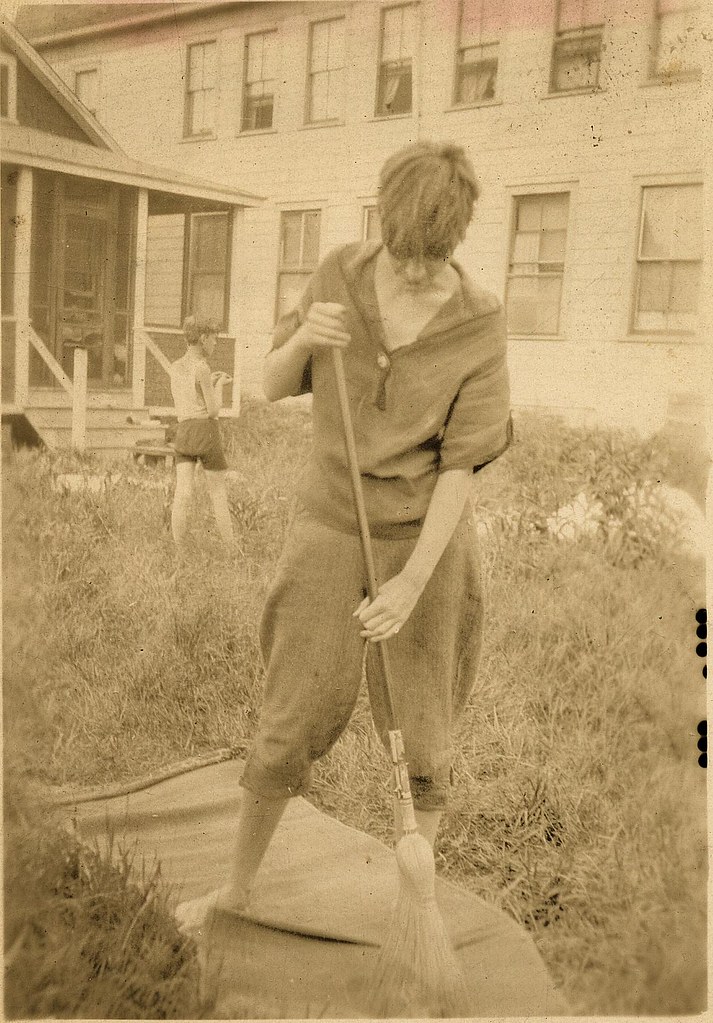
Dorothy Day sweeping: photographer unknown, n.d.(courtesy of Jim Forest)
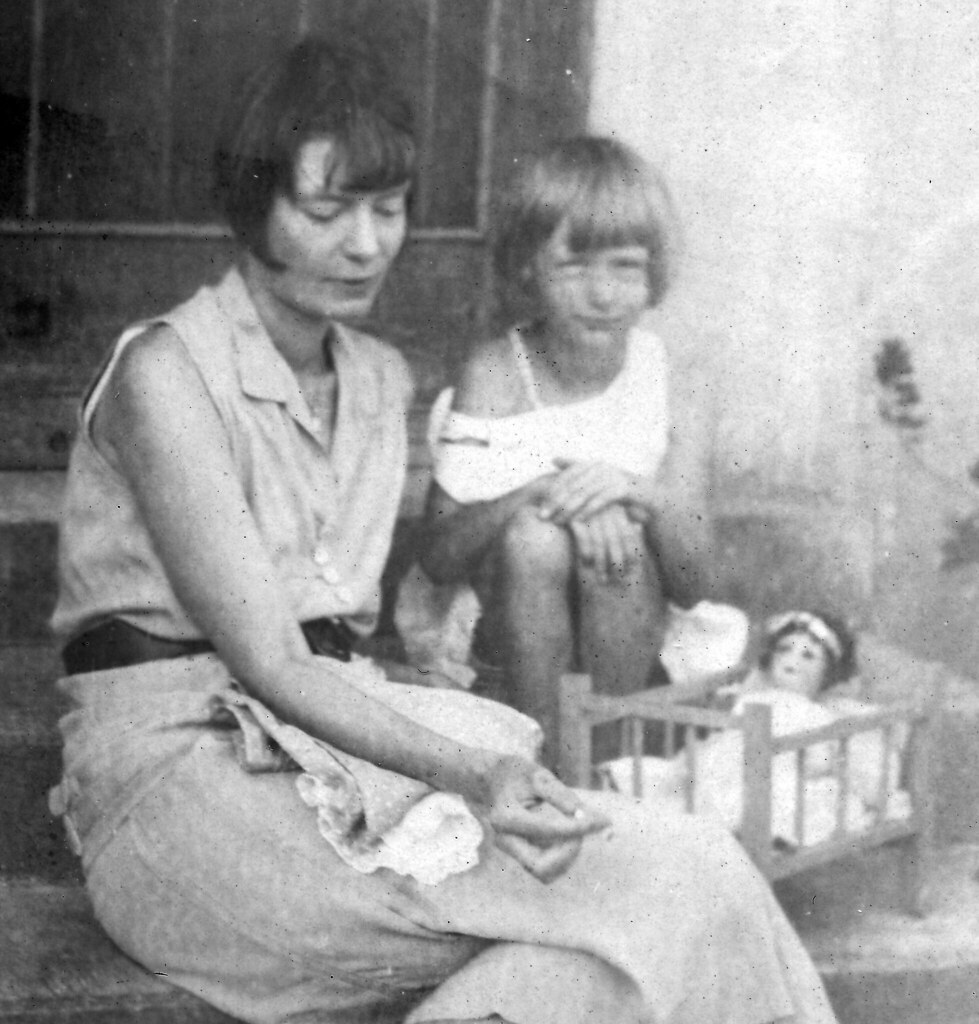
Dorothy Day with daughter Tamar (b. 1926): photographer unknown, n.d.(courtesy of Jim Forest)

What Price Love? one of Dorothy Day's serialized novels, written for sustenance during her daughter Tamar's infancy, Chicago Herald and Examiner: image courtesy of Jim Forest
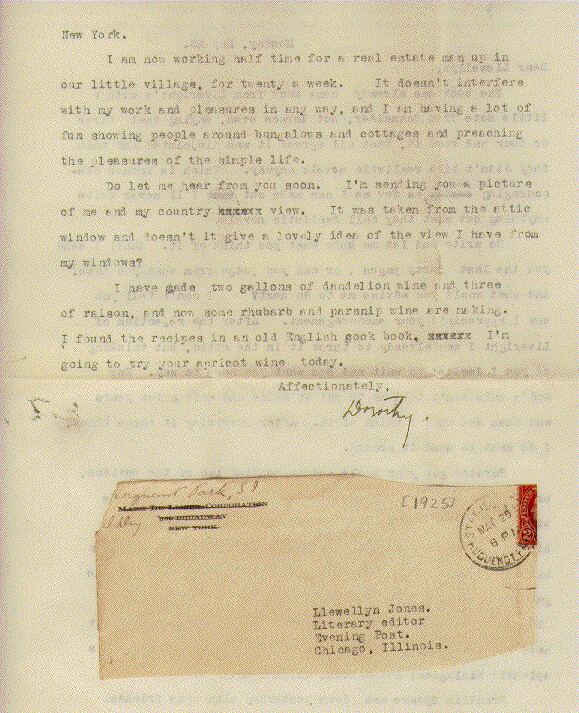
Dorothy Day letter to Llewellyn Jones, literary editor, Chicago Evening Post, 25 May 1925: image courtesy of Jim Forest
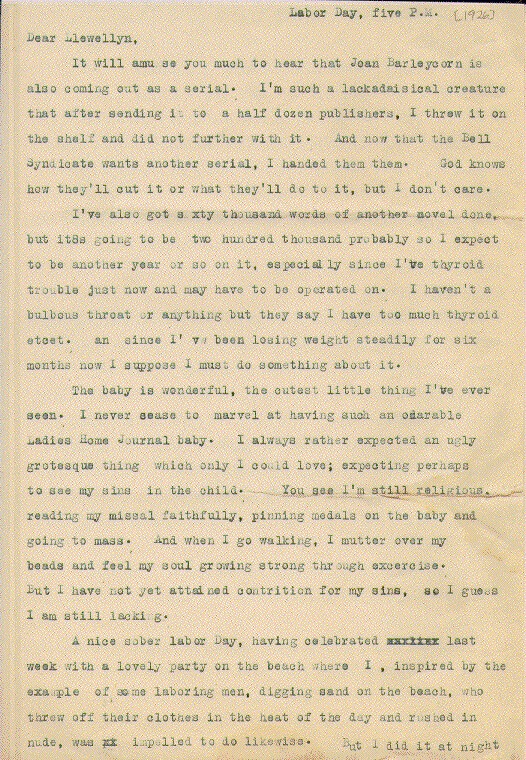
Dorothy Day letter to Llewellyn Jones, literary editor, Chicago Evening Post, Labor Day 1926: image courtesy of Jim Forest
When Dr. Stern wanted to know whether I was an alcoholic, when Dwight Macdonald asked me seriously whether I drank longshoremen under the table -- I can only confess that yes, I did "fling roses with the throng." (22 April 1958)
-- from The Duty of Delight: The Diaries of Dorothy Day, ed. Robert Ellsberg, 2008
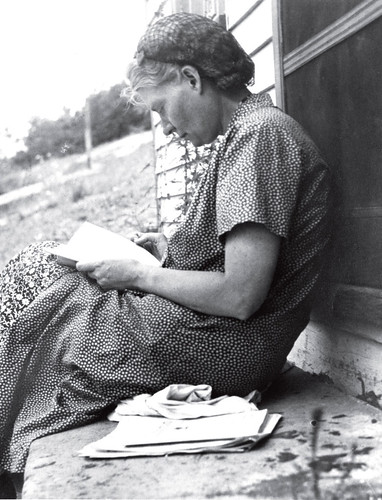
Dorothy Day reading: photo courtesy of Jim Forest, n.d., from Jim Forest: All Is Grace: A Biography of Dorothy Day, 2011 (via Catholic Worker Journal)
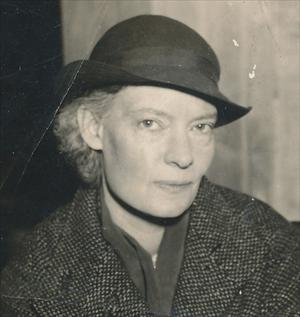
Dorothy Day: photographer unknown, n.d.(courtesy of Jim Forest)
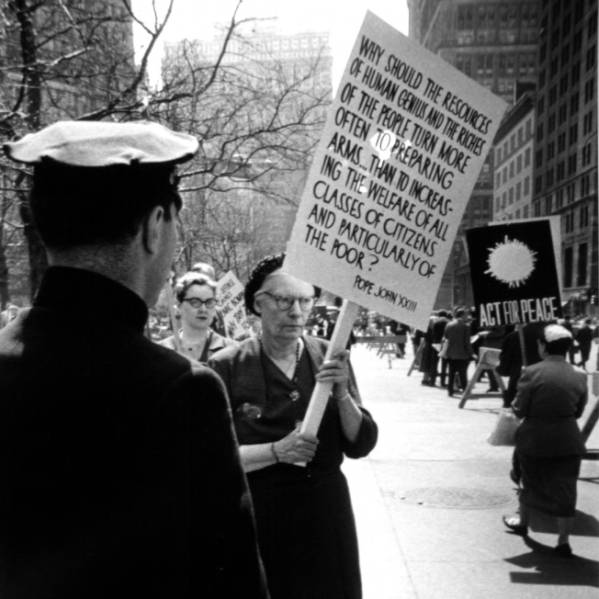
Dorothy Day participates in peace demonstration, New York City: photographer unknown, 17 April 1959 (courtesy of Jim Forest)

Refusing to take shelter, Dorothy Day participates in civil defense drill protest at City Hall Park, Manhattan; Ammon Hennecy, carrying a picket sign, is behind her: photo by Mottke Weissman, 1960, from Dorothy Day: Loaves and Fishes, 1967 (courtesy of Jim Forest/Catholic Worker Archive, Marquette University)
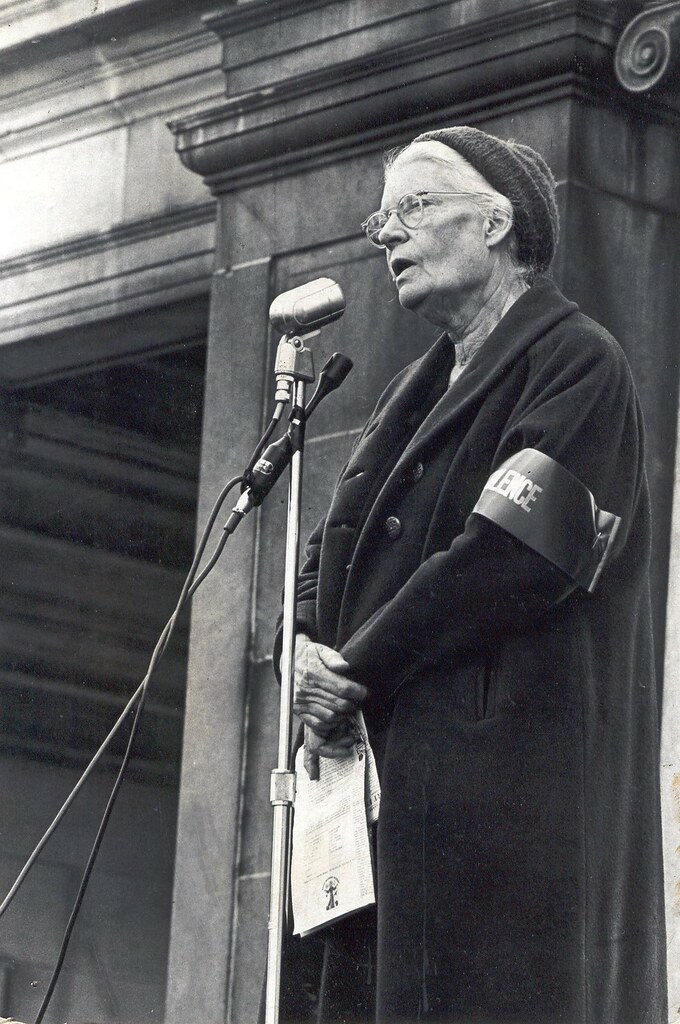
Dorothy Day at draft card burning, Union Square, New York City.: photographer unknown, 3 November 1965 (courtesy of Jim Forest)

Dorothy Day at Catholic Worker in Manhattan: photo by Meyer Liebowitz for New York Times, 1972 (courtesy of Jim Forest)
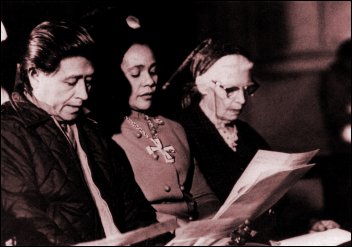
Cesar Chavez, Coretta Scott King, Dorothy Day: photographer unknown, c. 1973 (courtesy of Jim Forest)
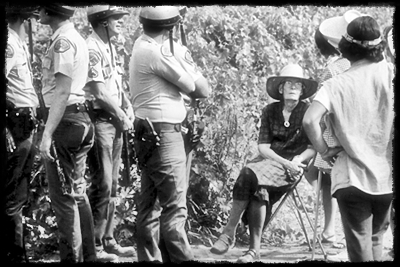
Dorothy Day, United Farm Workers protest, Lamont, California, 1973: photographer unknown, 1973 (courtesy of Jim Forest)
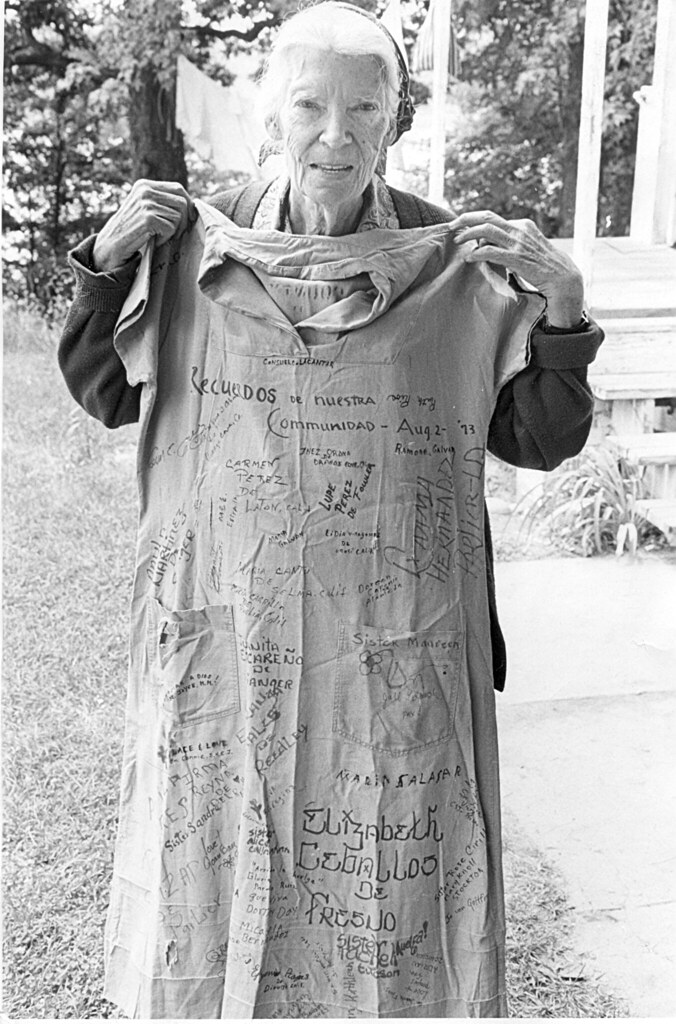
Dorothy Day, age 75, with the dress she wore during her last time in jail, a ten-day stay following arrest during protest to support the efforts of Cesar Chavez to provide justice for farm laborers in the fields of California; dress is signed by fellow inmates: photo by Jack Payden-Travers, 1973 (courtesy of Jim Forest)

Dorothy Day's last meeting with Mother Teresa, in Dorothy's room at Maryhouse in Manhattan, the year before her death; Eileen Egan is on the left: photo by Bill Barrett. 17 June 1979 (courtesy of Jim Forest /Marquette University Archives)
for Duncan Jones
Dorothy Day: Don't Call Me a Saint
ReplyDeleteThank you for this, Tom.
ReplyDelete"...to live so close to the bottom..."
"My very life is a protest".
"We have all known the long loneliness".
You can only look at a life like Dorothy's and wonder. Shows up the shadow of our complicities a little too well.
Her work still goes on under the surface of things. Friends of ours live in community at the London Catholic Worker Farm.
SAINTS EVERYWHERE
ReplyDeleteThere are saints everywhere, saints in their
beds aloft in the ship of night
whose dreams are breathless marathons passing
significant heavens up ring after ring
to the highest center
encircled by a filigree of angels,
there are gaunt saints under trees holding leafy staves
whose gazes are neither focused on
the outside nor
inside worlds, they
stand aloft on long bamboo legs
and watch herons of blue light
take off and land among shadows with
faces of sick children,
there are saints calling intercontinental long distance
who leave prayers on our message machines
to enlighten the universe about the
bounty bestowed on each one of us from the single
Divine Source of creation, whose strong voices grow
frail by the thunderous
bulk of their message and whose
eyes are so blue the whole sky
becomes their apprentice in blueness,
unknown saints, known or unknown to themselves or others,
whose neon brightness in their bones lights up
a corner in
heaven somewhere known or unbeknownst to them,
car mechanic saints greasy and creased under cars,
faces like winter street lamps through catastrophe ice storm,
grocery clerk saints no more than 17 years old
tote loaded bags to the trunk, help the
invalid in, Boy Scout stuff that in
this world's like
orchids in the arctic of our
universal social breakdown,
saints with faces of butterfly powderiness,
saints with faces of blasted wood, broken iron,
whose hearts are valleys with
openings all the way to the sea,
whose feet are always
taking them places, and whose
hands are always doing things,
whose thoughts and whose
heartbeats have enough
electricity in them to run
one or two New Yorks and a few scattered
Cairos through the most
difficult seasons.
7/10/94 (from A Hundred Little 3D Pictures, Ecstatic Exchange, 2013)
Daniel,
ReplyDeleteThat's beautiful.
Though people insisted, Dorothy always rejected out of hand the proposal that she ought to be canonized.
"Don't call me a saint!"
She wanted to be thought of as what she was -- a woman and a worker.
Duncan,
Yes, Dorothy's work continues, all round the world.
The Oakland Catholic Worker is a sanctuary, an island of peace in a war zone, shelter for those fleeing other war zones.
Sowing Seeds of Peace: Oakland Catholic Worker (Obrero Catolico de Oakland)
For some decades now there have also been essential food and shelter programs run out of Dorothy Day House, Berkeley.
On continents far apart, the work begun by Dorothy affected our own families. Angelica's father in NZ, corresponding with DD for many years, donating all his life to CW from meagre funds -- and my mother, in Chicago, serving in CW soup kitchens all through her last years.
A's father, a lifelong pacifist, records a proud moment in a private memoir.
"Ammon Hennecy, the 'One Man Revolution' came to visit me."
The record of inspirational service goes on, and on... in this sense it seems to me that while Dorothy's body is no longer here, her spirit still walks these troubled paths of the human.
Thanks Tom. I'm using her statement (thanks to you and this rich site) as an epigraph to that poem, in the book I'm now proofreading for publication... it's such a perfect epigraph it gives me the shivers (the physiological kind of which I hope you are now over).
ReplyDeleteOh, and according to us (sufis, muslims) there are saints who know they are but everyone else doesn't, there are saints that don't know they are and everyone else does, and then there are those saints (I sat with ones in Morocco and the Sensei in San Francisco) who know they are (with all humility) and so does everyone else... it's practical and luminous, actions and blessings or blessedness, not canonization with its rigorous selectivity as in the Christian Path, though natural ones abound there too...
ReplyDeleteIt’s good to be reminded of the history of struggle, and the struggle of history. We need two, three, many Dorothy Days. Thanks Tom.
ReplyDeletewonderful post...
ReplyDeleteThanks so much for this post Tom. One of my alltime favorite humans, Dorothy Day, whose voice and example, along with Teilhard deChardin and Pope John XXIII made it possible for me as a young man to see not all those in the Catholic faith I grew up, with and most of my people still practice, were hypocrites.
ReplyDeleteThanks, Michael. Me likewise. Can't help wondering how Dorothy might have responded to living in the new surveillance state. My guess is, not by hiding under the apron of lies we have all about us now. There's a picture of her, taken by a woman friend, getting out of a car. She's in her seventies. There is an evident fury; she is involved with one of her many causes (always all of our causes as well). In the photo her rage is evident. One can feel the fire. The woman who takes the picture captions it -- "Dorothy, barking mad". We could use a bit of that salutary righteous anger -- and moral courage -- now. We have been given an example. A very young man, but still -- never too young (or old) to begin. Even if it's too late to effectively oppose or resist, still, buying the program, accepting it all, taking it lying down... one suspects that would not have been Dorothy's way, as long as she could still draw breath.
ReplyDelete"We need two, three, many Dorothy Days." (Hazen)
Now there's a nondenominational prayer good enough for all of us, I reckon.
Reminded that when Herbert Hoover was in the Casa Blanca, he called Dorothy a threat to national security. To her, defiantly independent soul that she was, that would probably have sounded like a reverse compliment -- considering the source.
ReplyDeleteAnd, talking of prayer as we were just now (and though in light of what's going on right now this might seem a bit unlikely), here's our current President, speaking at the 2012 National Prayer Breakfast:
"We can’t leave our values at the door. If we leave our values at the door, we abandon much of the moral glue that has held our nation together for centuries, and allowed us to become somewhat more perfect a union. Frederick Douglass, Abraham Lincoln, Jane Addams, Martin Luther King, Jr., Dorothy Day, Abraham Heschel -- the majority of great reformers in American history did their work not just because it was sound policy, or they had done good analysis, or understood how to exercise good politics, but because their faith and their values dictated it, and called for bold action -- sometimes in the face of indifference, sometimes in the face of resistance."
Agreed Tom. And thanks for the quote from Obama.It would make sense that a former community organizer would know of and appreciate Day. He needs someone like her in his inner circle.
ReplyDelete